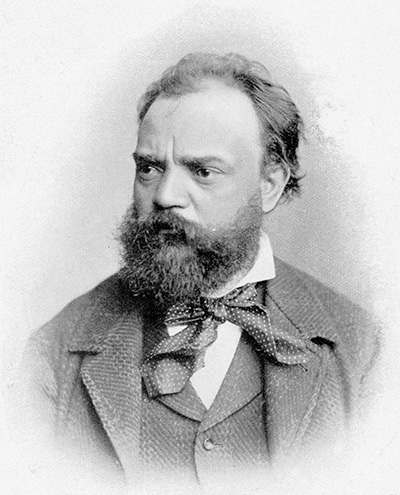Antonín Dvořák

- Born: September 8, 1841, Nelahozeves (near Prague), Czechia (Austrian Empire)
- Died: May 1, 1904, Prague, Czechia
String Quartet in F Major, Op. 96, American
- Composed: 1893
- Premiere: January 1, 1894 in Boston by the Kneisel Quartet.
- Duration: approx. 26 minutes
It was the summer of 1893, and Czech composer Antonín Dvořák was vacationing in Spillville, Iowa. He was only two years into his tenure as director of the National Conservatory in New York, and a severe economic depression known as The Panic of 1893 had just depleted the financial assets upon which the conservatory operated. Dvořák had been brought to New York with the explicit mission of founding a national school of composition, one that would serve as a medium for the expression of American identity in the same way that his own musical idiom had come to represent the Czech national character. Although he wrote of his conviction that the music of African Americans and Indigenous Americans should form the backbone of the national style, the seeds of the idiom that would eventually be known as jazz were only barely in their germinal stage. Thus, for Dvořák, creating Americanness meant adhering to certain general principles, such as tunefulness and clarity of formal design, while capitalizing on specific compositional devices, including pentatonicism, Dorian mode, dotted rhythms and rhythmic displacement.
The composition of the string quartet followed immediately after Dvořák’s Symphony in E Minor, From the New World, with which it shares superficial characteristics. But while the symphony was the product of urban 1890s New York, the quartet displays an intimacy and emotional simplicity appropriate to the sleepy Iowan town of 350 inhabitants.
The quartet opens with a confident viola tune built over the five notes of the F major pentatonic scale, which is quickly followed by a second theme, a tranquil hymn-like tune in A major. In the development of the movement, Dvořák opts for the more learned style—a fugato in F minor, again over a pentatonic framework—before settling back into the hymn tune. He brings the movement to a concise close with a coda extracted from the opening theme.
The second movement is reminiscent of the nature that surrounded Dvořák in Spillville. The melody flows against the backdrop of an ostinato figure in the lower strings, punctuated with woodland noises, and is suggestive of the composer’s description of Iowa to friends at home: “A farmer might be separated from his neighbor by perhaps four miles… You won’t cross paths with anyone and you’re just glad to see the infinite numbers of cattle in the meadows and woods that graze here all year round.”
In the third movement, the character of the music changes abruptly to one of celebration. Constructed from a single musical fragment of 12 notes, it calls to mind the parallel scherzo movement of Dvořák’s New World Symphony. The composer intended the tune to evoke the call of the summer tanager, a songbird indigenous to North America. He offsets its cheerfulness with a tongue-in-cheek minor tune that immediately gives way to the F major theme again.
Dvořák’s final movement bursts with joy and playfulness. The composer constructed it around a sonata-rondo form, linking the sections by means of a bouncing staccato rhythm in the accompanying voices. The rondo episodes contrast in character: the first is a contrapuntal and highly chromatic chorale, while the second is yet another pentatonic melody, evocative of a harmonica tune. The main theme returns for the last time with a newfound air of triumph and unrestrained merrymaking.
Of the pervasive tunefulness and simplicity of the work, Dvořák later observed, “When I wrote the quartet in 1893 in the Bohemian village of Spillville, I had wanted to write something for once that would be very melodious and simple. I always saw Papa Haydn in front of my eyes, that’s why it came so easily. And good thing that it did.”
—Dr. Scot Buzza